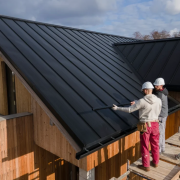If you’re considering replacing your old boiler or installing a new one, you may be wondering about the timeline for the installation process. The duration it takes to fit a new boiler can vary depending on several factors, including the type of boiler, the complexity of the installation, and the professionals you hire for the job.
In this comprehensive guide, we will break down the process step by step and provide you with a clear understanding of how long it typically takes to fit a new boiler.
Understanding the Basics
Before we get into the nitty-gritty details of the installation process, let’s start with the basics.
What is a Boiler?
A boiler is a heating appliance designed to provide hot water or steam for heating purposes. It’s a crucial component of your home’s central heating system.
Why Consider a New Boiler?
Upgrading to a new boiler can offer several benefits, including improved energy efficiency, reduced heating costs, and enhanced heating performance; click here to get a free boiler quote.
Types of Boilers
There are various types of boilers available, including combi boilers, system boilers, and conventional boilers. The type you choose can impact the installation time.
Find out how long it take to fit a new boiler here
Factors Affecting Installation Time
Now, let’s delve into the factors that can affect the duration of a new boiler installation.
Boiler Type
Different types of boilers have varying installation complexities. Combi boilers, for example, tend to be quicker to install than conventional ones.
Location and Access
The location of your boiler and the ease of access for installers can impact the time required. If it’s in a tight space or difficult to reach, installation might take longer.
Boiler Capacity
The size and capacity of your new boiler also play a role. Larger boilers may require more time for installation.
System Conversion
If you’re converting from one heating system to another (e.g., from a conventional system to a combi boiler), this can extend the installation time.
Additional Work
Any additional work, such as upgrading pipework or radiators, will add to the overall installation duration.
The Installation Process
Now that we’ve covered the factors influencing installation time let’s walk through the typical installation process.
Step 1 – Assessment and Planning
Before the actual installation, a qualified engineer will assess your home’s heating needs and plan the installation accordingly. This is a crucial step to ensure the right boiler is chosen and installed efficiently.
Step 2 – Removal of Old Boiler
If you’re replacing an existing boiler, the first step is to remove the old one. This can take several hours, depending on the complexity.
Step 3 – Installation of New Boiler
Installing the new boiler involves connecting it to the existing heating system, installing pipework, and ensuring all safety measures are in place. This step can take anywhere from a few hours to a full day.
Step 4 – Testing and Commissioning
Once the boiler is installed, it undergoes rigorous testing to ensure it functions correctly. This includes checking for leaks, proper heating, and safety features. This can take a few hours.
Step 5 – Final Checks and Cleanup
The last step involves final checks and cleaning up the work area. It’s essential to leave your home in pristine condition. This step typically takes a couple of hours.
Morning to Afternoon: Your Boiler Installation Timeline
Morning (8:00 am – 12:00 pm)
- 8:00 am: The installation team arrives at your home promptly at 8 am, as scheduled. They will first perform an initial assessment of your existing heating system, the location of the new boiler, and any necessary preparations.
- 8:30 am: The old boiler removal begins. This process involves disconnecting the old boiler from the gas and water supply, as well as removing any other components that need replacement.
- 9:30 am: With the old boiler removed, the installation team can start preparing the area for the new boiler. This includes cleaning and potentially making adjustments to ensure the new boiler fits perfectly.
- 10:30 am: The new boiler is brought in and positioned in place. The team will then connect it to the existing gas and water supply, along with any required pipework and controls.
Lunch Break (12:00 pm – 1:00 pm)
- 12:00 pm: The installation team takes a well-deserved lunch break to recharge for the afternoon. This break is essential to ensure they stay energized and focused on completing the installation to the highest standards.
Afternoon (1:00 pm – 5:00 pm)
- 1:00 pm: After lunch, the team continues with the installation process. This includes fine-tuning the boiler’s settings, testing for leaks, and ensuring all safety measures are in place.
- 2:30 pm: Once the boiler is fully installed and operational, the team will provide you with instructions on how to use it efficiently and safely. They’ll also answer any questions you may have.
- 4:00 pm: A final check and inspection are carried out to ensure everything is working correctly and that there are no issues or safety concerns.
- 5:00 pm: The installation is complete, and the team cleans up the work area, removing any debris and ensuring your home is left in a tidy state.
Conclusion
In conclusion, the time it takes to fit a new boiler varies depending on several factors, including the type of boiler, location, and any additional work required. On average, you can expect the installation process to span anywhere from a day to a few days.
Now that you have a better understanding of what to expect, you can make an informed decision about upgrading your boiler for improved heating efficiency and comfort.
FAQs
How much does a new boiler installation cost?
The cost of a new boiler installation can vary widely depending on factors such as the type of boiler, additional work required, and your location. It’s best to get quotes from reputable installers.
Do I need to be present during the installation?
It’s advisable to be present during the installation to address any potential questions or concerns the installer may have.
How often should I service my new boiler?
Regular boiler servicing is essential to maintain its efficiency and safety. It’s recommended to have your boiler serviced annually by a qualified engineer.













Comments